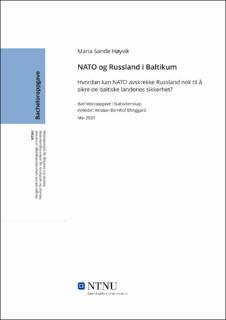| dc.contributor.advisor | Ellinggard, Kristian Bernhof | |
| dc.contributor.author | Høyvik, Maria Sande | |
| dc.date.accessioned | 2020-07-07T16:03:38Z | |
| dc.date.available | 2020-07-07T16:03:38Z | |
| dc.date.issued | 2020 | |
| dc.identifier.uri | https://hdl.handle.net/11250/2661113 | |
| dc.description.abstract | Denne bacheloroppgavens tema er det turbulente forholdet mellom forsvarsalliansen North Atlantic Treaty Organization (NATO) og Russlands, spesielt i den baltiske regionen hvor de to aktørenes målsettinger støter sammen. NATOs sviktende evne til å holde sine forpliktelser om å beskytte sine medlemsstater problematiseres og mulige løsninger diskuteres. Oppgaven har en todelt problemstilling, hvor den første er stilt for å gi utgangspunkt til den andre. De to lyder som følger: 1) “Er forholdet mellom NATO og Russland i Baltikum best beskrevet som et sikkerhetsdilemma eller en avskrekkingssituasjon?” og 2) “Hvordan kan NATO avskrekke Russland tilstrekkelig for å sikre de baltiske statenes sikkerhet?”
Videre er oppgaven utformet som en kvalitativ dokumentanalyse. For å besvare problemstillingen(e) brukes strukturell realisme, avskrekkingsteori og teori om sikkerhetsdilemma, samt empiri fra forskningsartikler fra vitenskapelige tidsskrifter. Det konkluderes med at situasjonen best kan beskrives som en ved avskrekking, og at den beste og mest oppnåelige måten for NATO å tilstrekkelig og vellykket avskrekke Russland i Baltikum er ved å bistå økonomisk til forbedring av baltisk forsvar og infrastruktur. | |
| dc.description.abstract | This bachelor thesis' theme is the turbulent relationship between the defense alliance the North Atlantic Treaty Organization (NATO) and Russia, especially in the Baltic region where the two actors' main objectives clash. NATO's failing ability to keep their obligations to protect their member states is problematized and possible solutions are discussed. The thesis' research question is two-fold, and the second is based on the first. The two read as follows: 1) "Is the relationship between NATO and Russia in the Baltics best described as a security dilemma or a deterrence situasjon?" and 2) "How can NATO sufficiently deter Russia to ensure the security of the Baltic States?"
Furthermore, the thesis is designed as a qualitative document analysis. In order to answer the research question(s), structural realism, deterrence theory and the theory of security dilemmas are used, as well as research papers from scientific journals. The thesis concludes that the situation can best be described as one of deterrence, and that the best and most achievable way for NATO to successfully and sufficiently deter Russia in the Baltics is by assisting financially to improve Baltic defense and infrastructure. | |
| dc.publisher | NTNU | |
| dc.title | NATO og Russland i Baltikum | |
| dc.type | Bachelor thesis | |
